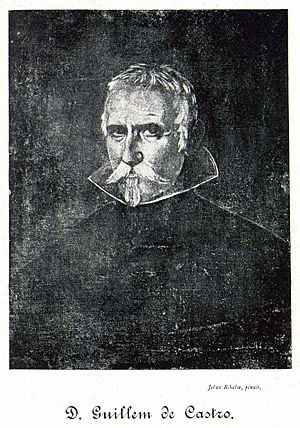Guillén de Castro y Bellvis facts for kids

Guillén de Castro y Mateo (born 1569 – died 28 July 1631) was an important playwright from Spain. He lived during the Spanish Golden Age, a time when art and literature were very popular. He was also a special member of a group called the "Nocturnos," which was like a literary club.
Contents
Life of Guillén de Castro
Guillén de Castro was born in Valencia, a city in Spain. He quickly became known for his writing. In 1591, he joined a local literary group called the Nocturnos. He had many different jobs throughout his life. At one point, he was a captain in the coast guard. He also worked for important leaders. In 1623, he became a knight. He moved to Madrid in 1626.
Guillén de Castro's Career and Plays
Guillén de Castro likely met the famous playwright Lope de Vega at special events held between 1620 and 1622. These events celebrated St Isidore, who is the patron saint of Madrid. At one of these events, Castro won first prize for his poems. Lope de Vega even dedicated one of his own famous plays, Las Almenas de Toro (1619), to Castro. When Castro's plays were published, he dedicated the first book to Lope de Vega's daughter.
Famous Plays by Guillén de Castro
The play that made Castro very famous is Las Mocedades del Cid. He wrote this play sometime between 1605 and 1615. Another famous playwright, Pierre Corneille, used much of this play to create his own well-known tragedy. Both parts of Castro's play feel like old Spanish stories. They were very popular because they showed strong national pride and had beautiful poetry.
Castro's play Fuerza de la costumbre was used as the basis for Love's Cure. This play is thought to be partly written by John Fletcher. Castro is also believed to have written El Prodigio de los Montes. From this play, Calderón got ideas for his play El Mágico prodigioso.
Don Quixote Play
Between 1605 and 1608, Castro wrote a play called Don Quixote de la Mancha. This play was based on parts of the famous novel by Cervantes with the same name. The play even included a part of the story about a character named Cardenio from the novel. Some experts believe that Castro's play might be a link between Cervantes' novel and a lost play from 1612. That lost play, called Cardenio, was written by William Shakespeare and John Fletcher.
See also
 In Spanish: Guillén de Castro para niños
In Spanish: Guillén de Castro para niños
 | Georgia Louise Harris Brown |
 | Julian Abele |
 | Norma Merrick Sklarek |
 | William Sidney Pittman |

